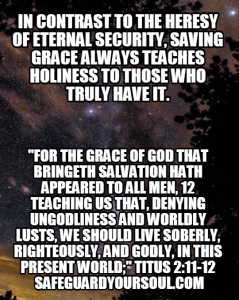Articles
The Perversion of Grace

by Dr. Robert B. Thompson
The following is an excerpt from a book titled THE PERVERSION OF GRACE by Dr. Robert B. Thompson. This clearly identifies what “grace” in many evangelical circles is defined as.
“Grace” As Currently Defined by Many Believers
The term grace is used in our day to represent a waiving of God’s requirements concerning man’s behavior, an alternative to them. Christ is seen as coming to earth primarily to forgive the moral shortcomings of the believers so they may go to Heaven when they die.
The concept is that through the centuries man has not been able to meet God’s expectations. Therefore God in His love and mercy has made it possible for unimproved man to inherit life in the spirit Paradise in Heaven. The blood of Jesus is a “ticket” which sinful, rebellious man may use to obtain entrance to peace and joy in the spirit realm.
It is stated that it is not necessary for man to change his behavior; rather, it is his profession of “faith” in Christ that brings him into fellowship with God. In actual practice the profession of faith often proves to be a mental assent to certain theological facts rather than true faith in the living Jesus.
 Grace is currently understood to be a changing of God’s standard of righteous and holy behavior, a changing of God Himself, so that man through Christ may be able to receive the inheritance of a son of God even though he remains sinful, self-centered, and disobedient to God.
Grace is currently understood to be a changing of God’s standard of righteous and holy behavior, a changing of God Himself, so that man through Christ may be able to receive the inheritance of a son of God even though he remains sinful, self-centered, and disobedient to God.
An unchanged Adam is permitted back into Paradise. He is given to eat of the tree of life. Untransformed believers serve as kings and priests of God. God accepts man as he is, through Christ.
The father comes to his prodigal son in the pigsty, runs to him and falls on his neck, kisses him, puts the best robe on him, a ring on his finger and shoes on his feet, kills the fattened calf, and restores the family inheritance to him. The son then arises from among the pigs and returns to his riotous living, knowing his father will never disown him.
How unscriptural, misleading, and destructive is the doctrine of “once saved always saved” (meaning if we once make a profession of faith in Christ we never again need to worry about the judgment of God)! How many teachers of the Christian faith will stand before God with their followers and discover that God judges every man according to his works!
The story of the prodigal son teaches not only forgiveness but also true repentance as the means of gaining that forgiveness. How would the story have ended if the prodigal had never returned to his father?
Modern Christian theology stresses the father’s forgiveness but not the son’s repentance, apart from which there could have been no forgiveness or restoration.
 The early apostles stressed repentance.
The early apostles stressed repentance.
When they heard these things, they held their peace, and glorified God, saying, Then hath God also to the Gentiles granted repentance unto life. (Acts 11:18)
It is “repentance toward God, and faith toward our LORD Jesus Christ” that brings us to eternal life (Acts 20:21).
And the times of this ignorance God winked at; but now commandeth all men every where to repent: (Acts 17:30)
Repentance is more than belief or feeling sorry for our sins. To repent is to turn away from the world, from sin, and from self-will. To repent is to turn to God, to righteous and holy works and obedience to the Lord. Any conversion experience that does not include the works of repentance does not bring salvation to the believer. It is not enough to believe or be remorseful—or even to confess our sinful state. There must be the works of repentance.
The implication of current teaching is that the citizens of Heaven and Hell are not distinguished by the kind of people they are but by whether or not they profess faith in the fact that Jesus died for their sins and was raised from the dead.
We know that if Jesus comes to an individual and he refuses God’s Christ, the judgment of God abides on him. We are not implying we can refuse to bow the knee to the Lord and then please God by our works. We cannot save ourselves by our own righteousness now that God has given His Son to die for our sins on the cross.
However, in our haste to show that man cannot save himself and that God has a grand plan of redemption for us, we have thrown out the proper scriptural balance. We are discounting the value God places on godly behavior. We are forgetting that only those who practice righteousness are accepted of God:
But in every nation he that feareth him, and worketh righteousness, is accepted with him. (Acts 10:35)
The Scripture declares plainly that the person who practices unrighteousness will be judged of God whether or not he or she professes faith in Christ.
. . . I will give unto every one of you according to your works. (Revelation 2:23)
It is taught that the judgment of the believer’s sins was accomplished on the cross and all that God will judge henceforth is the believer’s works of service (meaning he will receive a marvelous reward if he serves God and a lesser reward if he does not). The contemporary doctrine is that the professor of faith in Christ has nothing to fear in the Day of the Lord even though he has neglected to serve Christ during his life on the earth.
The hastiest review of the New Testament writings will make plain that the concept of the lukewarm Christian having nothing to fear is a dreadful corruption of Paul’s doctrine of the grace of God in Christ.
And cast ye the unprofitable servant into outer darkness: there shall be weeping and gnashing of teeth. (Matthew 25:30)
We have made the Word of God of none effect by our traditions.
What a perversion of the Gospel of the Kingdom modern Christian teaching is!
Indeed, God does forgive the repentant heart. But God does not say, “I love you anyway even though you will not serve me.”
Rather, God commands, “Go and sin no more.”
God is not mocked. He understands well the difference between the truly repentant individual and the person who is presuming on God’s compassion so he may continue in his sins and rebellion.
We cannot outwit God by using the Gospel of Christ as a legal technique such that we can preserve our way of life and still receive the inheritance. God captures the crafty in their own craftiness. God deals shrewdly with the crooked (Psalms 18:26).
If we think carefully concerning what is being conveyed today, the grace of God in Christ is seen to be an admission of defeat on God’s part. Man, being hopelessly sinful and rebellious, will not serve God. God, therefore, has created a device known as “grace” whereby man can walk in unrighteousness, moral filth, and disobedience to God and still have fellowship with God through Christ.
How many ministers of the Gospel are living in sin today because of this concept of grace? They are trusting (and teaching) that God waives His standard and brings people into fellowship with Himself while they continue in their sins and rebellion against God.
“No one is perfect” they cry and proceed to practice sin and foolishness.
The logical conclusion of the present concept is that Paradise and the new Jerusalem are filled with sinful, self-centered, rebellious individuals who are “saved by grace” (meaning God does not see what they are or what they do because they are “covered” by the righteousness of Jesus). What the inhabitants are in nature and behavior has not been changed. Rather, they have been brought into a better environment (in Heaven) and partake of the righteousness of Christ by identification, not by transformed behavior..
Believers in Christ who do not, through His grace, overcome the world, their lusts, and their self-seeking, are still sinful, disobedient personalities after they die; unless being shed of our body of itself results in a change in our nature. But there is no passage of Scripture that teaches or implies that physical death results in a change in our personality or that the Lord Jesus will change our personality (other than our body) at His appearing.
Physical death is an enemy, according to the Scripture (I Corinthians 15:26), not the means of our transformation into the image of God. Also, we must consider the fact that Satan and other bodiless creatures rebelled against God while in the realm of spirits. If being in the spirit realm causes us to serve God, how, then, was it possible for the angels to transgress?
What passage of Scripture teaches us we become righteous, holy, and obedient to God on the basis of our entrance into the spirit realm, or that the Lord Jesus will transform lukewarm believers into mighty kings at His appearing? Is it not true rather that what we have become during our life on earth will be revealed at the Lord’s coming?”
Sign up for free email devotional HERE… The Moments with My Master email devotional is sent out for the edification of the body of Christ.
-

 America4 years ago
America4 years agoThe Drugging of America: The Pharmakeia Sorcery Deception [podcast]
-

 Articles4 months ago
Articles4 months agoChildren being Rescued in Tunnels: Happening Now – UPDATE!
-

 Articles6 years ago
Articles6 years agoSelf-Examination in Preparation for the Lord’s Return
-

 Apostasy4 months ago
Apostasy4 months agoSHOCKING List of False Prophets Most Believe are True









































